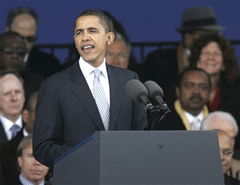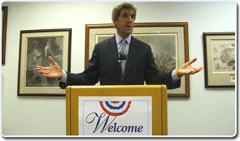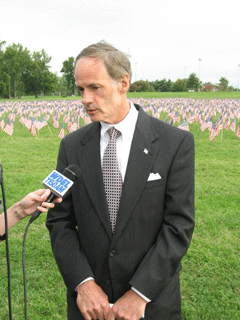Will Congress Act On Climate Change?
Air Date: Week of February 2, 2007

Senator Barack Obama, D-IL, speaks during the ground breaking ceremony for the Martin Luther King, Jr. Memorial. (Courtesy of the U.S. House of Representatives AP Photo/Lawrence Jackson)
Legislators on Capitol Hill took the first, halting steps toward a plan to address global warming. Key members, including several presidential candidates, say they have moved beyond debate about whether global warming is a real problem. But that does not make the debate on a solution any easier. Living on Earth’s Washington correspondent Jeff Young reports.
Transcript
CURWOOD: It’s Living on Earth. I’m Steve Curwood. With growing awareness of climate change now on the public agenda, the debate is rapidly shifting on Capitol Hill.
Until recently the choices in Congress have mostly been between imposing modest caps on global warming gases or having no caps at all. Now, key members of Congress - including several presidential candidates - are suddenly proposing much stronger action to restrict emissions. But as Living on Earth’s Jeff Young reports from Washington, that doesn’t mean the debate is any less contentious or complex.
YOUNG: One senator called it open mic night. When environment committee chair Barbara Boxer asked for ideas on climate change a third of the senate showed up for a marathon session. The result was the first outlines of a global warming policy from five competing proposals and four presidential contenders.
OBAMA: We’ve moved from the question “Is it real?” to the question, “What can we do about it?"

Senator Barack Obama, D-IL, speaks during the ground breaking ceremony for the Martin Luther King, Jr. Memorial. (Courtesy of the U.S. House of Representatives AP Photo/Lawrence Jackson)
YOUNG: That’s Illinois Democrat Barack Obama, maybe you’ve heard the name lately.
Obama decided to join two of his potential rivals for the white house—Senators Hillary Clinton and John McCain—in the Climate Stewardship Act. It’s the first major proposal in the senate to seek a mandatory cap on carbon dioxide emissions and set up a system for trading emissions permits. Obama says it’s the best way to commercialize clean energy technology.
OBAMA: Once you put a value on carbon reductions you make winners out of innovators, it’s a framework that’s not only good for the environment it’s also good for business and that, I think, is the classic American way.
YOUNG: All the major proposals so far include some form of this mandatory cap and trade system. But that’s where the similarities end. Massachusetts Democrat John Kerry says the Climate Stewardship Act does not do enough to avoid major changes to the climate.
KERRY: There is this ominous notion of a tipping point, which we have to avoid, so the bottom line is, we really, the reason I mention all this, I know it’s accepted, I know the science is accepted, but the urgency is not accepted up here.

Senator John Kerry, D-MA, speaks at a recent holiday reception. (Courtesy of the U.S. House of Representatives)
SANDERS: Some people have said, well, we don’t want to change the American lifestyle. Well you know what, I do. And if our lifestyle is about driving cars that get 10 or 12 miles per gallon as we destroy our planet I say yeah, I think the American people are, in fact, ready to change that aspect of our lifestyle.
YOUNG: Others say those deep cuts in emissions from all sectors of the economy are too drastic. Delaware Democrat Tom Carper favors a go-slow approach.
CARPER: Imagine you’ve got a car going down the highway at 55 miles per hour, you put the car in reverse. I think there’s a smarter approach. Slow down the car, slow down the growth of CO2 emissions. Stop the car, stop the growth of CO2 emissions, put the car in reverse. That makes a whole lot more sense to me.

Senator Carper, D-DE, at the Delaware Military Academy’s Commemoration. (Courtesy of the U.S. House of Representatives)
Senate energy committee chair Jeff Bingaman offered an independent cost review of his economy-wide cap and trade proposal—it’s about one-tenth of one percent of the country’s economic output. But that’s not good enough for Missouri Republican Kit Bond.
BOND: Witnesses testifying said it would have little macro economic effect. Well I’m not from state of macroeconomics; I’m from the state of Missouri. And I need to know how these proposals will hurt Missourians.
YOUNG: Bond’s point is this: even if a cap and trade system has moderate average cost, the cost is not evenly distributed—some regions come out losers. Michigan Democrat Carl Levin warned against fuel efficiency standards that would punish an already beleaguered US auto industry. Coal states are also concerned. And it’s in that economic anxiety that Oklahoma Republican James Inhofe is mining for votes to stop the climate change bills. When Republicans controlled the senate Inhofe was chair of its environment committee and repeatedly called global warming a hoax. And while other senators speak passionately about a responsibility to future generations, Inhofe is unfazed by the judgment of history.
INHOFE: Oh I think when it’s over, I’ll probably be long gone by that time.
YOUNG: I mean if you can envision a history book sometime in the future with the
entry: Senator James Inhofe on climate change, what would it say?
INHOFE: I think it would say that he was right.
[LAUGHTER IN THE BACKGROUND]
YOUNG: If Inhofe finds just 40 other senators worried about coal, cars or other carbon intensive industry, any action on global warming could freeze in its tracks. For Living on Earth I’m Jeff Young in Washington.
Links
"Senator Sanders Introduces the Global Warming Pollution Reduction Act"
"Six Major Energy Companies Endorse Senator Feinstein's Cap-and-Trade Legislation"
"Senators Kerry and Snowe Introduce Landmark Bipartisan Climate Change Proposal"
"Lieberman, McCain Reintroduce Climate Stewardship and Innovation Act"
Living on Earth wants to hear from you!
Living on Earth
62 Calef Highway, Suite 212
Lee, NH 03861
Telephone: 617-287-4121
E-mail: comments@loe.org
Newsletter [Click here]
Donate to Living on Earth!
Living on Earth is an independent media program and relies entirely on contributions from listeners and institutions supporting public service. Please donate now to preserve an independent environmental voice.
NewsletterLiving on Earth offers a weekly delivery of the show's rundown to your mailbox. Sign up for our newsletter today!
 Sailors For The Sea: Be the change you want to sea.
Sailors For The Sea: Be the change you want to sea.
 The Grantham Foundation for the Protection of the Environment: Committed to protecting and improving the health of the global environment.
The Grantham Foundation for the Protection of the Environment: Committed to protecting and improving the health of the global environment.
 Contribute to Living on Earth and receive, as our gift to you, an archival print of one of Mark Seth Lender's extraordinary wildlife photographs. Follow the link to see Mark's current collection of photographs.
Contribute to Living on Earth and receive, as our gift to you, an archival print of one of Mark Seth Lender's extraordinary wildlife photographs. Follow the link to see Mark's current collection of photographs.
 Buy a signed copy of Mark Seth Lender's book Smeagull the Seagull & support Living on Earth
Buy a signed copy of Mark Seth Lender's book Smeagull the Seagull & support Living on Earth

